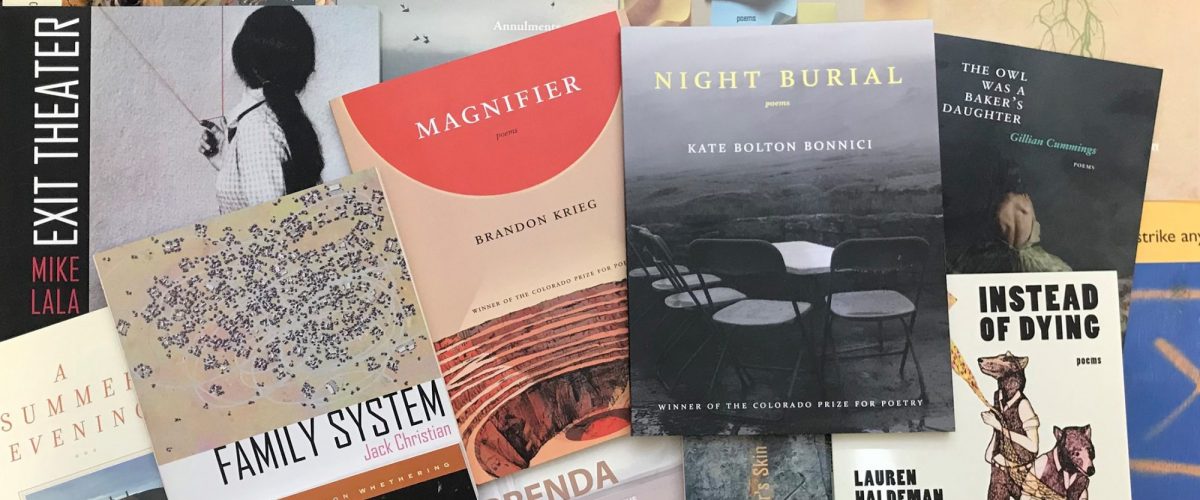Learn about the Colorado Prize for Poetry book contest

The Colorado Prize for Poetry is an international poetry book manuscript contest established in 1995. Each year’s prizewinner receives a $2,500 honorarium and publication of his or her book by the Center for Literary Publishing.

The Colorado Prize for Poetry adheres to the following Contest Code of Ethics, as adopted by the Council of Literary Presses and Magazines, of which the Center for Literary Publishing is a longtime member: “CLMP’s community of independent literary publishers believes that ethical contests serve our shared goal: to connect writers and readers by publishing exceptional writing. We believe that intent to act ethically, clarity of guidelines, and transparency of process form the foundation of an ethical contest. To that end, we agree to 1) conduct our contests as ethically as possible and to address any unethical behavior on the part of our readers, judges, or editors; 2) to provide clear and specific contest guidelines — defining conflict of interest for all parties involved; and 3) to make the mechanics of our selection process available to the public. This Code recognizes that different contest models produce different results, but that each model can be run ethically. We have adopted this Code to reinforce our integrity and dedication as a publishing community and to ensure that our contests contribute to a vibrant literary heritage.”
Current Winner

We are very pleased to announce that Asha Futterman's Song of Gray has been selected by final judge Craig Morgan Teicher as the winner of the 2025 Colorado Prize for Poetry. Her book will be published by The Center for Literary Publishing at Colorado State University in November 2025.
"Asha Futterman’s debut, Song of Gray, is a book of devastating insight and clarity, and introduces a vital new poet. America’s inexhaustible racism is one urgent muse: in sharp, staccato lyrics that leap easily back and forth across the lines of logic, Futterman maps 'the abyss/ between nothingness and infinity,' an area of gray areas, where 'a black name is often registered/ as little more than an encounter with power.' These poems drive toward a kind of offhand aphoristic wisdom, toward language so irreducible, it could only be the truth: 'he died shoveling snow/ that melted the next day/ poetry makes/ nothing happen.' Again and again, Futterman arrives at a tense sort of wisdom—'there is no changing what is happening/ what is not happening'—which is to say, everything is something else and also nothing else. These are confusing, terrifying times: I want these remarkable poems for company." —Craig Morgan Teicher
Asha Futterman is an actor and poet from Chicago. She holds an MFA in poetry from Washington University in St. Louis. Her chapbook, empathy, was published by The Song Cave in 2024. Her work appears or is forthcoming in Poetry, Bennington Review, Conduit, and The Journal. She currently teaches children in Brooklyn.
We'd also like to congratulate our 2025 Colorado Prize for Poetry finalists:
Mike Bagwell, "When We Look at Things We Steal Their Color and Grow Heavy Under Their Weight"
Aimee Cervenka, "The Family Ghost"
Cady Favazzo, "Even the Parts I Promised to Myself"
Joanne Godley, "How the Black Panthers Fell From the Sky"
Melanie Han, "No Way of Returning Home"
AT Hincapie, "What Survives a Fire"
Rochelle Hurt, "Lightboxes"
Karla Kelsey, "Isolation Songs"
Mickie Kennedy, "Let It Be the Bird"
Whitney Koo, "Cry Sower"
Priyanka Kumra, "Borderlands: Cartography of Longing"
David Leftwich, "at dawn, the first of the first to sing"
Lisa Lewis, "Present and Future Storm"
Meher Manda, "Some of Many Women"
Angelo Mao, "A White Horse Is Not a Horse"
Derick Mattern, "Name the Walls Yourself"
Nick Minges, "Feeling Extremely Fatigued in California"
Sara Lupita Olivares, "BEAM"
Samuel Piccone, "Domestica"
Megan Shevenock, "Who Thinks About You"
Maria Surricchio, "Even in Winter"
Hans Wagner, "Time Enough Lands"
Mat Wenzel, "Telling the Bees"
Submission Guidelines
Contest Procedures
Once all the entries have been received--whether paper or electronic--they are divided, depending on the total number of entries received, among six to eight outside preliminary judges; the Center does not use interns to judge for this contest. Each preliminary judge will select three to four manuscripts, for a total of twenty-four finalists. If a preliminary judge recognizes the work of a colleague, student, or friend, they will contact the Center and that manuscript is sent to another preliminary judge.
The final judge then receives the finalists from which to select the winner. If the final judge wishes to see additional manuscripts from the preliminary judges, they may request them; the judge is not, however, permitted to request specific manuscripts. Friends, colleagues, and students (current or former) of the final judge are not eligible to compete, and the judge agrees to refrain as well from selecting any manuscript that presents a conflict of interest (selecting, for example, a manuscript he or she has helped to develop).
Frequently Asked Questions
If your question hasn’t been answered here, e-mail us at creview@colostate.edu or give us a call at 970-491-5449.